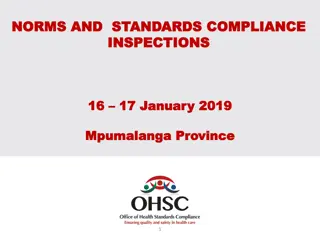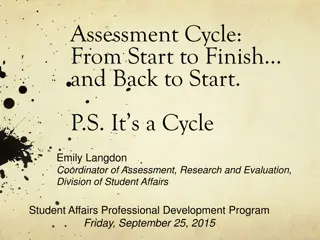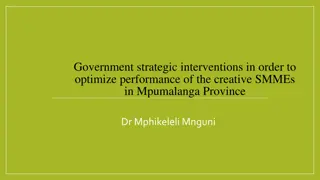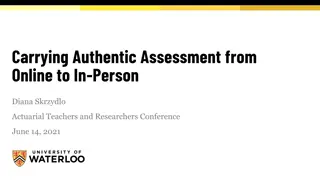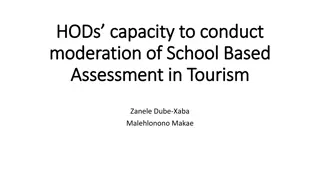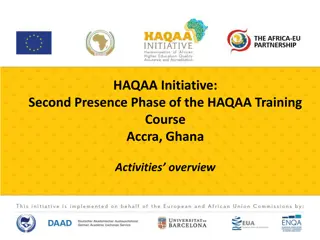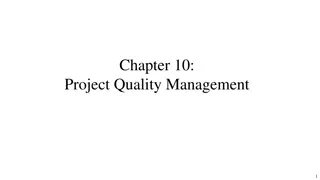Enhancing Assessment Quality in Mpumalanga Department of Education
Teachers in Mpumalanga Department of Education strive to improve assessment quality through the Provincial Common Assessment initiative, focusing on summative assessments and standardizing assessment practices across grades 3 to 11.
Download Presentation

Please find below an Image/Link to download the presentation.
The content on the website is provided AS IS for your information and personal use only. It may not be sold, licensed, or shared on other websites without obtaining consent from the author.If you encounter any issues during the download, it is possible that the publisher has removed the file from their server.
You are allowed to download the files provided on this website for personal or commercial use, subject to the condition that they are used lawfully. All files are the property of their respective owners.
The content on the website is provided AS IS for your information and personal use only. It may not be sold, licensed, or shared on other websites without obtaining consent from the author.
E N D
Presentation Transcript
WHEN THE SUN RISES WE WORK HARD TO DELIVER The use of common tests to support teachers in developing quality tests in Mpumalanga Department of Education Dr HN Mkhwanazi and Dr FE Khumalo 1
INTRODUCTION Teachers have to conduct classroom assessment to establish whether learning has taken place. Assessment is a complex task, require teachers to be competent . Four main purposes of assessment ( baseline, diagnostic, formative & summative) This research paper reports on administration of summative assessment known provincial common assessment (PCA). 2
ABOUT PCA PCA initiative by MDE to improve learners achievement of educational outcomes. It aims to ensure that that quality assessments instruments are developed & quality tests are administered to the learners. grades 3, 6, 9 to 11 with the purpose of standardising assessment in the province. June and November Common timetable Marks obtained form part of summative assessments & used for promotional purposes. Set by a team of panel members formed by an examiner, moderator, translator & proof reader. Developed in line with CAPS. Subjects and grades not accommodated are set by individual schools, moderated and approved by SMTs. 3
SUMMARY OF THE ADMINISTRATION OF PCA GRADE SUBJECT FREQUENCY 3 Home languages, English FAL and Mathematics 6 June & English FAL, Mathematics, Social Sciences, Creative November Arts & Natural Sciences 9 Maths, Mathematical Literacy, Physical Sciences, Life 10 Sciences, Agricultural Sciences, Accounting, Economics, Business Studies, History, Geography, English FAL, 11 Technical Mathematics and Technical Sciences 4
BACKGROUND Prompted by the low achievement levels of learners. ANA 2011 & 2012; PIRLS; SACMEQ IV; 2015 TIMSS; NCS. Release of 2010 NSC results, MEC for Education raised a serious concern regarding the learners performance of grade 12 learners. She questioned the quality of teaching, learning and assessment in the all grades and the quality of assessment tasks administered to the learners. She announced commissioning of an investigation into internal assessment practices of schools. Investigation included amongst others: a thorough investigation of assessment practices (alignment of assessment tasks to curricula requirements, early identification practices, remedial support offered to learners, moderation practices at schools, circuits, districts & provincial levels); examination of the support given to schools by circuits and districts on assessment. 5
RATIONALE Research undertaken by two officials appointed in Public Examinations and Assessment (PEA) directorate in Mpumalanga. They coordinate assessment in the province. responsible for training of examiners and moderators in developing quality tasks for MDE. They realise importance of developing quality tasks for assessment in schools. Generally , they have interest in assessment matters. 6
PURPOSE OF THE STUDY present the common tests administered to grades 3, 6, 9 to 11 learners in MDE. ensure that learners are provided with quality tests. support teachers with quality tests. 7
RESEARCH QUESTIONS Main research question: How do the provincial common tests support schools? Sub questions: What do teachers understand about provincial common tests? How do teachers benefit from the common tests? How are teachers developed to set quality tests? 8
Literature Review Standardized tests administered to a large and same group of participants on the same day and time. administered and scored in a consistent/standardised manner. designed in such a way that the questions, conditions for administering, scoring procedures, and interpretation are consistent administered to assess what is taught at the national level. administered to measure objectives and how schools are meeting educational standards of that country. public policy strategy to establish stronger accountability measures for public education. Provincial common tests administered to a large and same group of participants on the same day and time Schools should adhere to the provincial timetable. provincial marking guideline (for each subject tested) used for marking . However each teacher should mark, score and record scripts for his or her respective classroom. 9
Research Method Qualitative approach Three data sources June and November 2017 final question papers; Feedback reports of June and November 2017 provincial common tests; Semi-structured interviews with teachers. 10
FINDING # 1 Teachers understanding of the provincial common tests tests set by MDE to support teachers and learners with quality tests. tests set outside the schools, not certain whether the tests are set at the district or provincial office. Teachers share different views about the purpose of provincial common tests. purpose is to evaluate teachers completion of the Annual Teaching Plan. to support schools with quality tests. evaluate their teaching competency. 11
FINDING # 2 Benefits of teachers from the provincial common tests tests allow the teachers to ensure that work is done and assessed according to the Annual Teaching Plan. Save their time since it replaces one of the formal tasks for June and November. Instrumental in assessing various skills and knowledge. Learners become exposed to question papers which assess various skills and knowledge. 12
FINDING # 3 Teachers development on setting of quality tests all teachers feel that they are not adequately trained to set quality papers. training received was general, little was done on setting of quality question papers. Shadow training, provided with notes without unpacking/ explanation. Assessment framework was not discussed. However, test developers better capacitated during their orientation meetings with PEA and Subject Heads. 13
RECOMMENDATION # 1 Teachers understanding of the provincial common tests Officials in PEA and the Subject Heads communicate the purpose of PCA since some teachers were not clear. Subject heads at the provincial head office takes full control of the process by designing programmes which would ensure that all teachers have a common understanding of provincial common tests and the clear purpose thereof. Subject advisors should have a designated programme focusing mainly on the setting of the setting of question papers. The programme should also indicate support that will be given to teachers during and after the trainings. The subject policy should be considered in developing such a programme so that all requirements for assessing a subject are adhered to. 14
RECOMMENDATIONS # 2 2. Benefits of teachers from the provincial common tests ensure that all teachers become knowledgeable on how PCA aims to support . The Provincial Department of Education should ensure that teachers are part of the setting panels so that they fully participate in the process and benefit themselves and their schools. The teachers participating in the setting of common papers should also rotate periodically in order to benefit a large pool of teachers in the province. Subject advisors should ensure that all teachers cover the prescribed content to be examined for that examination period. For instance, for the June common tests, teachers must have covered all the work prescribed for that period. 15
RECOMMENDATION #3 Teachers development on setting of quality tests Subject advisors should have a well-designed programme for training of teachers in the development of quality tests. Training of teachers on developing quality tasks should not be paired with other activities. Teachers should also be encouraged to attend all training programmes related to development of quality tests. Subject advisors should support teachers individually at schools to ensure that challenges regarding the development of quality tests are addressed. Focussed training could be done for such schools in order to bring them on board with the rest of the schools. MDE should monitor and evaluate the teachers trainings on setting of quality question papers in order to ensure that those trainings achieve the intended results 16
LIMITATIONS OF THE STUDY Small contribution towards a deeper understanding of how common tests support teachers in developing quality tests in MDE. present the implementation of provincial common tests, however, it has little focus on the teachers development. of setting quality tests. The study only documented teachers views of PCA, without providing the teachers development to support teachers. Generally, it was established that teachers in this study were not trained on setting of question papers, so they lacked knowledge and skills. It could be regarded as unfair to the teachers to be interviewed in a field they were not knowledgeable about. However, teachers are supposed to develop quality tests. The data obtained about the teachers setting of quality tests was therefore limited. The fact that semi structured interviews were conducted to twenty-two teachers is limitation of the study. The sample was not a good statistical representation of the teachers in Mpumalanga. Thus, it would not be proper to generalise the findings to all teachers in the province. 17








